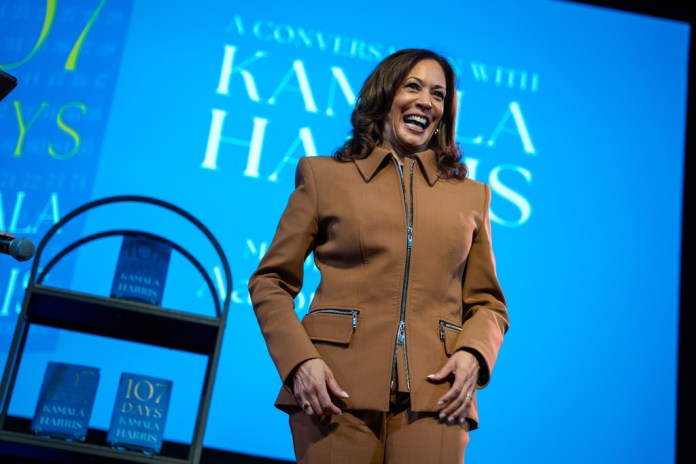Five takeaways from Kamala Harris’s All the Smoke podcast interview – Washington Examiner
In a recent interview on the *All the Smoke* podcast, Vice President Kamala Harris discussed her presidential campaign, emphasizing her commitment to promoting “opportunity” in local communities as she gears up for the 2024 election. This is one of her most extensive interviews since becoming the Democratic nominee. During the conversation, she expressed her support for legalizing marijuana, reflecting a significant shift from her earlier stance as California’s district attorney, where she enforced cannabis laws and opposed its legalization.
Harris also highlighted her experiences as a member of a blended family, addressing criticisms regarding her lack of biological children and emphasizing the importance of chosen family dynamics. She spoke about her identity as a Black woman, drawing strength from her upbringing and the barriers she aims to break for future generations.
Additionally, Harris reiterated her vision for an “opportunity economy” that focuses on supporting small businesses and announced plans for equitable housing and child tax credits. Lastly, she stressed the necessity of ongoing civil rights advocacy, indicating that mass protests remain vital for progress in racial justice and other social issues. Her appearance on the podcast demonstrates her strategy to engage with younger and diverse voter demographics ahead of the upcoming presidential race.
Five takeaways from Kamala Harris’s All the Smoke podcast interview
Vice President Kamala Harris sat down with All the Smoke podcast hosts Matt Barnes and Stephen Jackson to discuss her presidential campaign agenda and her plans for growing “opportunity” in local communities, the latest sign the vice president is looking to amp up her outreach to voters with fewer than 40 days until the 2024 election.
In one of her longest interviews since becoming the Democratic nominee for president, which aired on Monday, Harris signaled her support for legalizing marijuana — one of her many flip-flops since she, as a district attorney and later attorney general of California, ascended to becoming a U.S. senator. Her policy swaps have been noted by the media and voters as she runs a competitive campaign against former President Donald Trump, who has also changed his tune on marijuana legalization and other policy areas.
Harris also spoke about her blended family and role in breaking barriers as the first black woman to secure a major-party nomination for president, as well as her plans for an “opportunity economy” to build up small business owners and minority families.
“I think we have a system that fails people, if only the exceptional can get out,” Harris told Barnes and Jackson. “That’s a failure of a system.”
Harris and Trump have utilized podcasts this cycle as a way to reach young voters, minority voters, casual voters, and independents ahead of a contentious presidential contest. The longer format of the interview allowed Harris to get personal, sharing her love of cooking and nacho-flavored Doritos as a guilty pleasure, as well as her routine of working out every day and emphasizing the importance of mental health.
1. Harris advocates legalizing marijuana despite her history of prosecutions in California
Harris reaffirmed her support for legalizing marijuana during the interview, an initiative that is on the ballot in states like Nebraska and Florida.
“We have come to a point where we have to understand that we need to legalize it,” Harris said, adding that it’s “not a new position for me. I have felt for a long time we need to legalize it.”
As a senator and as a 2020 presidential candidate, Harris supported legalizing marijuana nationwide and expunging nonviolent marijuana-related criminal offenses. However, up until Monday, her campaign had been relatively silent on whether Harris maintained that position. She and her running mate, Gov. Tim Walz (D-MN), have ignored or sidestepped the issue.
“I just feel strongly that people shouldn’t be going to jail for smoking weed, and we know historically what that has meant and who has gone to jail,” Harris argued in the interview.
As district attorney in San Francisco, however, she had enforced cannabis laws and opposed legalized use for adults. She defended its usage for medicinal purposes, but her prosecutors convicted over 1,900 people on cannabis-related charges. When she was running for reelection as attorney general, she opposed legalizing marijuana for recreational use, which was supported by her GOP opponent.
By 2019, her first campaign for president, she reversed course and joked that she “did inhale” in her college days.
2. Harris touts blended families after being criticized for having no biological children
The vice president spoke warmly about her two stepchildren with second gentleman Doug Emhoff, saying she was “very intentional” when developing a relationship with Emhoff’s children and made it a priority to have a “very close and respectful” relationship with their mother, Kerstin Emhoff, who has been vocally supportive of Harris’s campaign.
The question came after Gov. Sarah Huckabee Sanders (R-AR) received backlash from Democrats and even some Republicans after she alluded that Harris “doesn’t have anything keeping her humble” because she doesn’t have biological children. The governor’s team has pushed back on those claims.
Harris said conversations on blended families have become more prevalent for her as she is running for president.
“The people who don’t get it aren’t understanding there’s a whole lot more of these kinds of relationships than people realize,” Harris said. “This is not the 1950s.”
She added that young people, especially, are better at understanding that there is the “family you are born into, and then there’s the family you choose.”
“And it’s on you to make a decision about what you want and how you define your family, and you have the right to do that,” Harris said.
3. Harris says she has been raised black from birth
Harris said her mother raised two “proud” black women, and to her, her identity was “never a question.”
The vice president’s race has been a focus for Trump and his supporters, with the former president drawing ire and having to defend himself on the debate stage after he questioned whether Harris was really black.
She also spoke about breaking barriers, noting that her mother told her, “Kamala, you may be the first to do many things, but make sure you’re not the last.”
“And I take that so very seriously,” Harris said, adding that she stands on the shoulders of mentors and those who broke barriers before her.
“I feel so strongly that, you know, each one, pull one,” the vice president said. “You gotta leave that door open more than it was when you walked in. And that’s what it means for me. I feel a great sense of responsibility.”
She said she wants to remind people that “you should never hear ‘no.’”
“I eat ‘no’ for breakfast,” Harris said.
4. Harris emphasizes plans for an ‘opportunity’ economy
Harris did not offer any new information on her economic plans should she enter the White House in 2025, but she reemphasized her plans to build an “opportunity economy” with small businesses as the focal point.
“Most people have ambition, they have aspirations, they have dreams,” Harris added. “If we give people the opportunity to meet those goals, they jump for it every time.”
She noted her work as a senator funneling billions into community banks to help small businesses access capital when they first start up. As part of her economic agenda, she proposed giving small businesses a tax deduction of $50,000 to start up, as opposed to the current deduction of $5,000.
“They’re in the community, and then they know who’s in the community, and where the talent is, and who’s doing good in the community and what the community wants,” the vice president said of the banks.
“The thing we know is that most of our small businesses, our entrepreneurs, who want to start a small business, got a great idea, have incredible work ethic, but they weren’t handed a bunch of money on a silver tray,” Harris added. “And they just need to get their foot in the door.”
Harris also spoke to her housing plan, pushing for the construction of 3 million new housing units and a tax incentive for builders who construct homes for first-time buyers, as well as a $40 billion fund to help local governments find solutions to the problem of supply.
She added that she wants to expand the child tax credit to $6,000 in the child’s first year.
“I start from the perspective that the vast majority of parents want to raise their children well. They love their children, but they don’t necessarily have the resources they need,” Harris said. “And if we understand that the children of a community are the children of the community, we’ll understand that an investment in something like the first year of a child’s life benefits all of us.”
5. Harris says march for civil rights must continue ‘in every generation’ and that Project 2025 is threat to advancement
Harris signaled support for mass peaceful protests regarding racial justice, arguing there is no significant progress “without the people often taking to the streets.”
In the wake of the murder of George Floyd in Minneapolis that kick-started a fresh wave of Black Lives Matter protests, Harris signaled support for the Minnesota Freedom Fund in a 2020 post urging people to chip in to help post bail for those arrested during protests after Floyd’s death.
Trump has incorrectly stated that Harris directly bailed people out of jail as recently as June at a rally in North Carolina. The Minnesota Freedom Fund issued a statement that Harris did not donate to the organization.
Harris also slammed Project 2025, a hard-right planning agenda that Trump has worked to distance himself from as both sides of the aisle have blasted its proposals as too extreme.
“My opponent in this race, look up Project 2025,” Harris said.
“Nasty work,” Barnes interjected.
“They are literally talking about what they would do to arrest people and deport them because they want to suppress,” Harris said. “We’re seeing a full-on intent to restrict rights. I strongly believe we have to always be vigilant, meaning whatever gains we’ve made, they will not be permanent unless we stay on it.”
“That’s about having those conversations when everybody gets together, whether it would be at the barber shop or around the kitchen table, to remind ourselves what’s happening and what we need to do about it,” the vice president continued.
" Conservative News Daily does not always share or support the views and opinions expressed here; they are just those of the writer."




